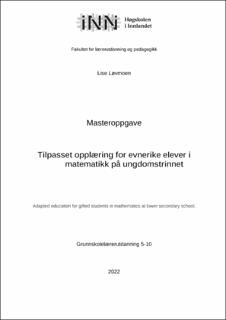Tilpasset opplæring for evnerike elever i matematikk på ungdomstrinnet.
Master thesis
Permanent lenke
https://hdl.handle.net/11250/3019752Utgivelsesdato
2022Metadata
Vis full innførselSamlinger
Sammendrag
Temaet for denne masteroppgaven har vært «Tilpasset opplæring for evnerike elever i matematikk på ungdomstrinnet». I denne oppgaven har jeg undersøkt hvordan lærere tilpasser undervisningen for evnerike elever og hvilke muligheter og utfordringer de ser ved dette arbeidet. Problemstillingen for denne oppgaven ble dermed:Hvilke muligheter og utfordringer møter matematikklærere i arbeidet med å tilpasse opplæringen for evnerike elever på ungdomstrinnet?Med påfølgende forskningsspørsmål: Hvilke erfaringer og praktiske grep gjør læreren for de evnerike elevene i matematikk?I min oppgave presenterer jeg to modeller for begavelse og en karakteristikk av evnerike elever. Videre har jeg fokus på teorier om undervisningskompetanse i matematikk, matematisk kompetanse, sosiokulturell læringsteori og to ulike oppgavetyper, rike oppgaver og problemløsning. For å finne svar på mitt forskningsspørsmål har jeg utført en kvalitativ studie. Jeg har gjennomført totalt seks intervjuer av fem matematikklærere, som jobber ved samme skole. Funnene er analysert og presentert under fire kategorier; evnerike elever, organisering, faglig innhold og læreres erfaringer. Mine funn tyder på at matematikklærere har en forståelse av definisjonen på evnerike elever, og at dette er en kjent problemstilling. Videre viser funnene mine at lærerne ser både muligheter og utfordringer ved tilpasset opplæring for evnerike elever. Som muligheter drar de frem den nye læreplanen, som legger til rette for utforskende arbeid og oppgavetyper som er kognitivt krevende. Utfordringene de nevner ved tilpasning av undervisningen for evnerike, er å ha tid til å planlegge gode opplegg for mange ulike behov, organisering av gruppestørrelse og lærertetthet. The topic for this master's thesis has been «Adapted education for gifted students in mathematics at the lower secondary school». In this thesis, I have investigated how teachers adapt their teaching for gifted students and what opportunities and challenges they see in this work. The problem for this thesis was thus:What opportunities and challenges do mathematics teachers face in the work of adapting the education for gifted students at the lower secondary school?With the following research questions:What experiences and practical steps does the teacher make for the gifted students in mathematics?
In my thesis I present two models for giftedness and a characteristic of gifted students. Furthermore, I focus on theories of teaching competence in mathematics, mathematical competence, socio-cultural learning theory and different types of assignments.In my thesis I present two models for giftedness and a characteristic of gifted students. Furthermore, I focus on theories of teaching competence in mathematics, mathematical competence, socio-cultural learning theory and two different types of problems, rich tasks and problem solving.To find an answer to my research question, I have conducted a qualitative study. I have conducted a total of six interviews of five mathematics teachers, who work at the same school. The findings are analyzed and presented under four categories: talented students, organization, academic content and teachers' experiences.My findings indicate that mathematics teachers have an understanding of the definition of gifted students, and that this is a known issue. Furthermore, my findings indicates that teachers see both opportunities and challenges in adapted education for gifted students. As opportunities, they highlight the new curriculum, which facilitates exploratory work and types of tasks that are cognitively demanding. The challenges they mention when adapting the teaching for the gifted are to have time to plan good plans for many different needs, organizing group size and teacher density.
